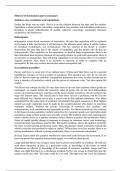History of Economics part 2 summary
Debates over socialism and capitalism
Earlier the focus was on value. Now it is on the relation between the state and the market.
Capitalism is about private ownership, competition, free markets and individual preferences.
Socialism is about redistribution of wealth, collective ownership, community interests,
cooperation and democracy.
Schumpeter
Schumpeter wrote about economics of innovation. He says that capitalism will be replaced,
not because it fails, but because it will develop to the ultimate point, where it will be replace
by socialism evolutionary, not revolutionary. The key concept to his theory is creative
destruction. He says that this is the nature of capitalism, and the people who do this are
entrepreneurs. They capitalize on the innovation. As head of large corporations, there is no
idea individual idea anymore. Because of increasing returns to scale with innovation, there is
an incentive to monopolize. This will bring capitalism to an end because there is no political
support anymore. Also, there is an incentive to innovate in order to compete with an
monopolist. By this way creative destruction makes monopolists fail.
Is socialism possible?
Pareto said there is some sort of an optimal state. Walras said that there can be a general
equilibrium, because we have a system of equations. The question was, why do we not just
plan it? Barone came up with this. Competition minimizes the costs, so why not just say we
have a ministry of production which sets the prices at minimum costs. You then mimic the
market.
Von Mises had critique on this. He says that when we do not have markets where goods are
exchanged, we cannot define the monetary value of goods. We do not have independent
owners of production factors, and thus not the factor market and prices. We do not know the
wage and interest rates. The crucial idea is that when you are a producer, you do it in the
most efficient way. Market prices play a crucial role in this optimal calculation. Von Mises
contended that the same types of economic calculations that guide resources to their highest
valued use under capitalism must be made by the socialist planner who desires to maximize
consumer welfare. Without the private ownership of resources, free markets, and
entrepreneurs, such calculations are impossible to make. Von Mises pointed out that contrary
to the hopes of some socialists, markets and prices for consumer goods were inevitable under
socialism so long as these goods were privately owned. The problem arises with capital goods,
whose relative prices in a market economy reflect relative scarcities and productive values.
Prices of capital quickly change in response to changes in consumer tastes, new technology,
entrepreneurial expectations, and the like. But under socialism, where all capital is owned by
the state, no such pricing mechanism exists. Thus, the planner cannot accurately evaluate the
relative scarcities and productive values of capital. “Where there is no free market, there is no
pricing mechanism; without a pricing mechanism, there is no economic calculation.”
So than Taylor asked the question whether the state itself could become the economist. If we
know the prices that equalize demand and supply, we could use these prices.
Lange said that Mises was wrong to claim that no prices are possible in socialism. He said you
need three categories of data: 1) a preference scale, 2) knowledge of the terms on which
alternatives are offered, 3) knowledge of the amount of resources available. Lange said Von
Mises was right that there is a calculation problem, but he was wrong to claim that only the
market could solve that. The state could do it as well. Through trial and error the planners
1





